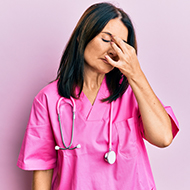Three-quarters of vets concerned about impact of menopause

More than 80 per cent of vets said the menopause had affected their physical health.
More than 75 per cent of vets are concerned about the impact of the menopause on their health, life and work, a new report has revealed.
A joint report by Veterinary Woman and the Society of Practising Veterinary Surgeons (SPVS) shows the profound impact of the menopause on veterinary working life, both on individuals and veterinary teams.
Of the 250 responses to the survey, more than 80 per cent said the menopause had affected their physical health, while nearly half said the impact on their mental health had been moderate to severe.
Among the most commonly reported physical symptoms were difficulty sleeping, fatigue and irritability. Night sweats, joint pain and hot flushes were also very common.
The most prevalent mental health impact highlighted by the survey was anxiety. Some of the respondents had also experienced clinical depression and suicidal thoughts, although the latter was rare.
Helpful measures introduced by employers were flexible working, help with heavy lifting and the provision of fans. Openness and understanding among colleagues and diary management to enable breaks were also highly valued.
Commenting on the findings, Liz Barton, editor of Veterinary Women, said: "As a predominantly female workforce, we cannot ignore the profound impact the menopause can have both on individuals and veterinary teams. The effects last for an average of seven years and impact a majority of women mid-career."
She added: "As a profession, we have an opportunity to lead this conversation as it's beginning to open up across the wider media."
The majority of respondents to the survey were women of menopausal age - and predominantly vets and veterinary nurses in clinical roles - but they also included practice managers and non-clinical staff.
Across the age categories, an awareness of the impact of menopause was wide-ranging. For those 40 years and older, understanding of the menopause averaged at around 4.3 out of 10. This figure increased to 7.4 out of 10 for those aged over 41.
The survey found that, despite relatively high levels of awareness, 90 per cent of respondents would like to learn more about the impacts of the menopause from either personal and/or business and human resource perspectives.
SPVS president, Anna Judson, commented: "Having experienced the effects of the menopause working as a practice owner, I wish I had known more about the impact and that I was not alone in how I was feeling.
“It's time to break these taboos, open up the conversation and put in place measures to mitigate the impacts. In so doing, we will not only help individuals to continue to thrive in their careers but also help practices to retain experienced staff at this challenging time of life."
A free, open-access webinar discussing the impacts of menopause and how to mitigate them is available to watch on the Veterinary Women website.



 The Veterinary Medicines Directorate (VMD) is inviting applications from veterinary students to attend a one-week extramural studies (EMS) placement in July 2026.
The Veterinary Medicines Directorate (VMD) is inviting applications from veterinary students to attend a one-week extramural studies (EMS) placement in July 2026.